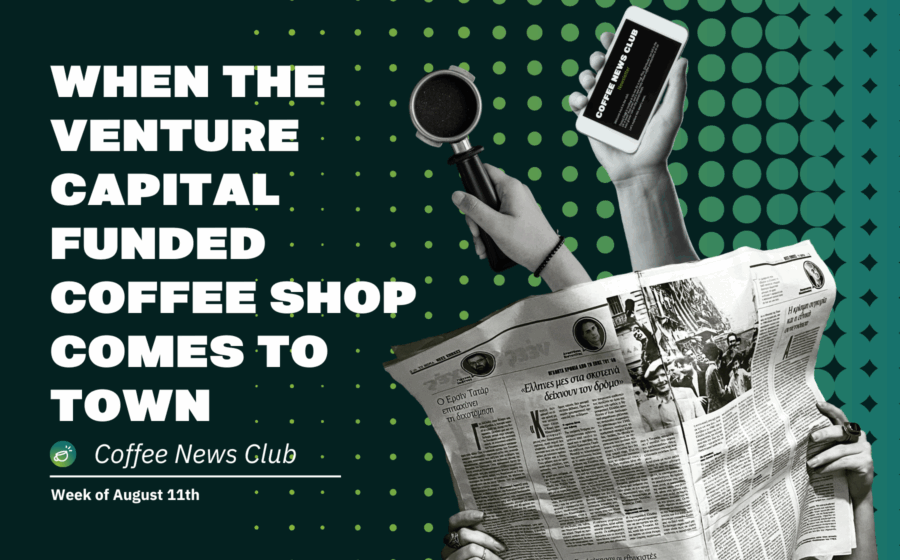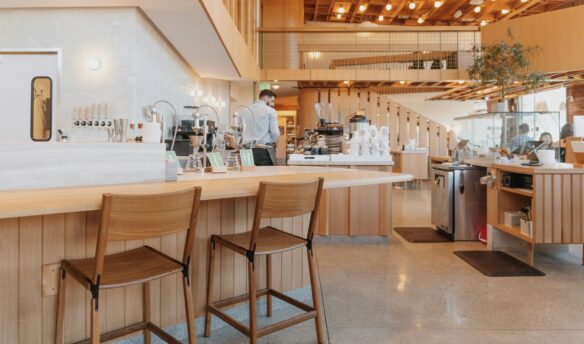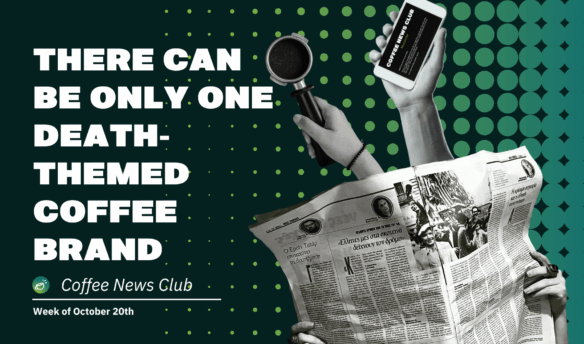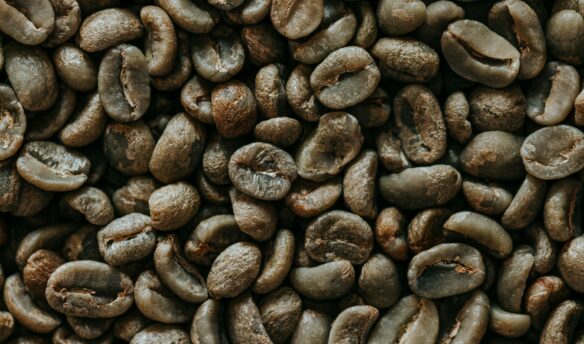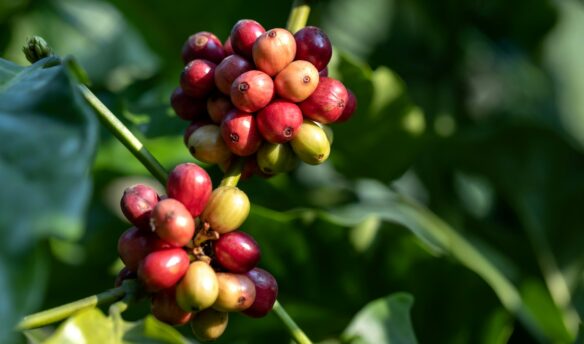Panama auction shatters records (again). Plus, Berlin becomes the center of a specialty vs corporate showdown, China encourages Brazilian exporters to send coffee their way, and late-night cups may fuel impulsive moves.
👋 Get the Coffee News Club newsletter in your inbox weekly—sign up.
‘As U.S. Tariffs Take Hold, China Authorizes 183 Brazilian Coffee Exporters’ – via Daily Coffee News
In 2024, the United States imported $2 billion worth of coffee from Brazil. That might soon change.
On August 6, the United States implemented a 50% tariff on imports from Brazil. Although American companies likely won’t stop buying coffee from Brazil, analysts believe the tariffs could sharply curb U.S. demand, putting pressure on Brazilian exporters and reshaping global coffee trade dynamics. To offset some of this predicted loss, Brazilian producers and exporters are trying to find alternate buyers.
China is pitching itself as one of those alternatives. Last week, the Chinese embassy in Brazil posted on social media that it would expedite authorization for 183 Brazilian coffee companies to export to China. These trade certifications will make it easier and cheaper for Brazilian exporters to ship coffee to China.
The timing of the unusually high number of authorizations is good for farmers, said Vinícius Estrela, executive director of the Brazil Specialty Coffee Association. Estrela told the South China Morning Post that with Brazil’s coffee harvest wrapping up and the U.S. becoming a less welcoming destination, the authorizations arrive “at the right moment—when the coffee is ready and waiting to move.”
Chinese coffee brands have been working to secure a steady supply of coffee as the country’s domestic market explodes. Last year, Luckin Coffee signed a deal to purchase $2.5 billion worth of coffee from Brazil. However, despite the growing domestic demand, China will not be able to absorb the loss of the U.S. market on its own.
Brazil’s coffee exports fell by 20% in July compared to the same month last year, which Bloomberg attributes in part to traders stockpiling beans amid the tariff uncertainty. While there’s been no indication that the Trump administration will roll back tariffs, last week, U.S. Commerce Secretary Howard Lutnick hinted at the possibility that coffee may be given an exemption. This is something industry bodies and lawmakers have been lobbying for ever since the tariffs were announced in April.
Read more on China’s pitch to Brazil here.
‘Best of Panama Auction Sees World-Record Price’ – via Global Coffee Report
At this year’s Best of Panama auction, a 20-kilo lot of washed Gesha coffee from Hacienda La Esmeralda sold for $604,080, or $30,204 per kg. For reference, the commodity coffee price on August 7, when the auction took place, was $2.98 per pound (about $6.57 per kg).
The Best of Panama competition is organized by the Specialty Coffee Association of Panama—after the competition, winning lots are sold in an online auction. After 549 bids, Dubai’s Julith Coffee won the first-place lot, at a price more than triple the previous record, set last year at $10,013 per kg for a coffee from the Lamastus Family Estates.
Julith just opened last week. Head roaster Serkan Sagsoz described the coffee as “the absolute pinnacle of flavour, craftsmanship and terroir.” The coffee scored 98 points, also a record.
“This result is recognition of the efforts of our entire team and the dedication that Panama has put into cultivating excellence,” said Rachel Peterson of Hacienda La Esmeralda in a press release. “We are thrilled to see how the world values the history and passion behind every cup of our precious coffee.”
Reaction to the auction was split, with many social media users offering congratulations to those involved. Arash Hassanian, CEO of Roastronix, which provided roasters for the competition, called the result “stunning,” noting that “it proved once again that Panama continues to set the global standard for excellence in coffee.”
There was also criticism of the high price at a time when many farmers struggle to make ends meet. Author and photographer Lucia Bawot noted that “all of that money could be put to use in so many other ways, ones that could support coffee communities that really need it.”
Read more on the record-setting auction here.
‘Germany’s Fast-Growing Chain Lap Coffee Puts Pressure on Established Local Cafes’ – via The Berliner
In cities across the world, a coffee war is raging, pitting independent specialty coffee shops against low-cost, tech-driven chains flush with investment cash.
In New York and London, venture capital-backed Blank Street Coffee is expanding quickly in two cities known for their established specialty coffee scenes. In Shanghai, China’s independent cafes are competing with Luckin Coffee’s deep pockets and low prices. In Seoul, indie coffee shops are trying to survive in a cut-throat price war with big chains and convenience stores, which often open right next door to their smaller rivals.
In Berlin, independent coffee shops are fighting their own interloper: LAP Coffee.
LAP, funded by U.S. investment firms, has opened 13 locations around Berlin in two years, offering convenience, slick branding, and cheap coffee. “Their pitch is to provide coffee that is good, fast and—most crucially—cheap,” reports The Berliner.
Phillip Reichel runs Isla Coffee in Berlin’s hip Neukölln neighborhood, and says LAP can sell cappuccinos for €2.50, which undermines the value of coffee. “We’ve been trying for years to show how valuable coffee is and why it has its price,” he said. Isla prices its cappuccinos at €3.50.
LAP (which stands for Life Among People) insists it isn’t trying to replace independent cafes and aims to attract a different demographic. In the article, the brand claims that its audience is “bike couriers, Gen Z students, and local artists,” although that sounds a lot like an independent cafe crowd. Much like Blank Street, LAP’s LinkedIn page describes its cafes as “micro-size hubs” and approaches coffee with “an emphasis on digitization” that “offer high quality products at a price point customers can afford.”
LAP has already opened stores in Munich and plans to expand to Hamburg next. Reichel, meanwhile, sees the company as an existential threat. “I think LAP Coffee will become increasingly present in the coming years and will displace many shops.”
Read more on Germany’s coffee wars here.
More News
‘Coffee Production Hits Record in Colombia, Reaching 10-Year High’ – via Colombia One
‘Art Forgers Used Coffee To Make Fake Picassos’ – via Sprudge
‘Coffee Farmers in Laos Say Agroforestry Requires More Than Mere Advice’ – via Daily Coffee News
‘MICE to Expand Connection with Origin Countries’ – via Global Coffee Report
Is Coffee Good For You?
It makes sense that you might want to avoid drinking coffee late at night: caffeine helps keep most of us awake, and beyond that, scientists have linked late-night sipping to trouble shutting your brain down for rest. But did you know it can also make you more impulsive?
That’s what researchers at the University of Texas at El Paso found when they looked at the effect of nighttime caffeine intake on inhibition and impulsivity in fruit flies.
Wait, fruit flies? Fruit flies are useful study subjects due to their “genetic and neural parallels with humans,” according to a press release from UTEP. The study, published in iScience, added caffeine into the flies’ diets under different conditions and doses, and then assessed their impulsivity by exposing them to a strong airflow and observing their reaction.
“Under normal circumstances, flies stop moving when exposed to strong airflow,” said lead author Erick Saldes. Researchers observed that fruit flies that consumed caffeine at night still kept moving, despite the strong winds. “We found that flies consuming caffeine at night were less able to suppress movement, displaying impulsive behaviors such as reckless flying despite these aversive conditions.”
The fruit flies didn’t have the same response when given caffeine during the day. The authors weren’t able to pinpoint an exact time when caffeine exerts its greatest impulsive impact. However, they note that “the findings could have negative implications for shift workers, health care and military personnel who consume coffee at night.”
Beyond the Headlines
‘Column: A Roaster’s Call for Tariff Transparency from Importers’ by Deaton Pigot



